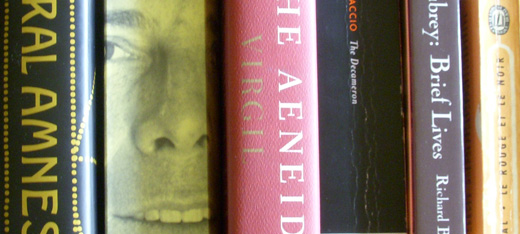Monday Morning Read
Instead of wrapping things up with this round of reads, I’ve added a book that I’d already started, Nam Le’s short-story collection, The Boat.
¶ In Aubrey, the letters T, U, and V; aside from Sir Edward Zouche, at the very end, only Ws remain. Two Taylors, Tombes, Tong, Triplett, Twisse, Tyndale, Ussher, Vaughan, de Vere, Villiers, and de Vischer. The “life” of Thomas Triplett (1603-1670) is given over almost entirely to an anecdote that has lost some of its sidesplittingness over the centuries, due to changes in our way of telling jokes no doubt. You can still tell, though, that it used to have them roaring by the fire.
I’ll tell you a story of our old friend (ie George Ent). His master Triplett was a great lover of honey, and one of his schoolfellow’s mother having sent a pot of honey to the doctor, G Ent put his schoolfellow to beg a little of his master, and he had got a small loaf and so they would have a feast. The doctdor was in his study; and the boy takes the confidence to approach, with his, “Quaeso, preceptor, da mihi mel (Please, teacher, give me some honey).” G Ent was sneaking behind. Said the disturbed doctor, “You audacious rascal,” and gave him a good cuff on the ear, “how dare you be thus impudent? Sirrah, who put you on?” The boy answered (whiningtly) “G Ent.” The enraged doctor flies out of his study (he was a very strong man), gives poor George a kick in the breech, and made him fly down a flight of seven or eight stairs to the landing place, where his head first came to. He was stunned, but ’twas well his neck was not broken. ‘Twas a most cruel and inhumane act to use a poor child so. It so happened that a day or two before G E had lost a tooth. He writes a letter to his father (now Sir George Ent) and encloses the tooth with it; relates the story that he has lost the tooth by that means. The next the grave and learned Dr Ent comes to Hayes (the fame of whose learning and testimony did give great credit and reputation to this school); expostulates with the doctor about his son. To be short, took him away, ,and placed him with Mr William Radford… This accident well-nigh did break Dr Triplett’s school. But shortly after this time, happened the restoration of his majesty, and then he was also restored to his former preferments.
You can’t help wondering if Dickens knew this story. Da mihi mel, indeed!
In the months and months since I began these morning reads, I have not dipped into a book of short stories until very recently, with Nam Le’s The Boat. My rule with books of short stories is to read one and only one story a day until the entire collection has been swallowed. Why it took me so long to hook The Boat to the morning read I’ve no idea — but then this has been, in so many ways, the season of No Idea. The book came to light over the weekend, buried in a pile of papers. I had already read the first two stories, so I resumed, this morning, with “Meeting Elise,” a fugue of mortality.
The narrator, Henry Luff, is a famous painter who is probably about to start dying of colorectal cancer — he’s in a lot of pain. He also misses his girlfriend, Olivia, a much younger woman who, after long bouts with drugs, died (apparently) of cancer. Henry took up with Olivia eighteen years ago, to which his wife responded by taking his baby daughter to St Petersburg, where the girl grew up to be a world-class cellist. Now, in the present of the story, father and daughter are set to re-unite. Only the daughter keeps backing out. Henry drinks two bottles of cabernet in the wine room of a well-known restaurant where I attended an anniversary party last winter. (La nourriture était excellente!)
Henry narrates the story with a vulgar gusto that I didn’t much care for on the page and should have quite detested in an actual person. I find that this is characteristic of people who suddenly find themselves on bad terms with their bodies. I have always been on bad terms with my body, insofar as we’ve been on terms at all, so I am never surprised when it acts up.
In Merrill, I come across something called “The Candid Decorator,” from a retrospective collection called The Yellow Pages (1974).
I felt it — dry as paper.
I called a decorator.
But the decorator, who sees the poet’s soul, advises him against making any changes, whereupon the poet throw him out and clutches, weeping and laughing, his “Grand Rapids chair.” Whether the design job is a stand-in for the poet’s life or for his work — and what, really, would be the difference? — it makes for a fine little drama.

